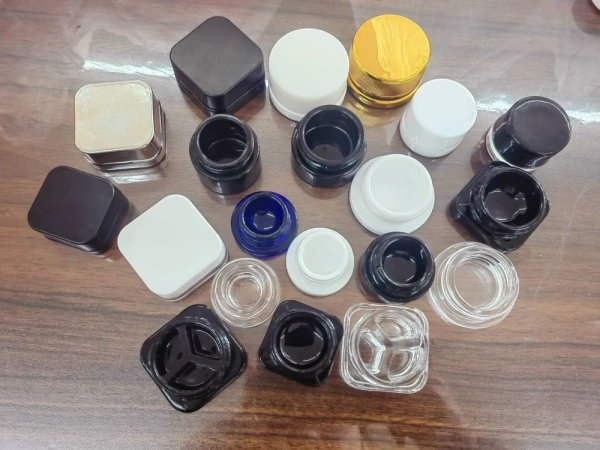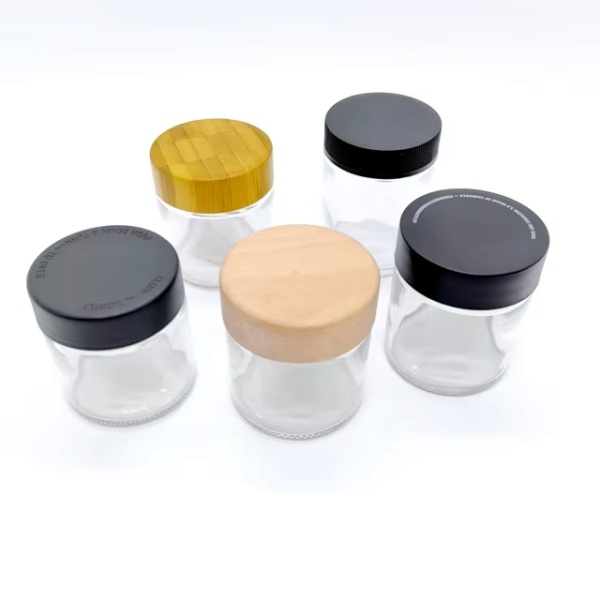This article provides a comprehensive overview of glass concentrate packaging, explaining why it's a superior choice for preserving the quality and potency of concentrates like shatter, dab, and BHO. It covers various types of glass containers, key features to consider, and how to select the right packaging to meet your business needs and ensure customer satisfaction. It's worth reading because it offers practical advice and insights directly from a manufacturer's perspective, helping businesses make informed decisions that can positively impact their brand reputation and bottom line.
Why is Glass the Best Way to Store Concentrates?
Glass is widely regarded as the superior material for storing cannabis concentrates. Unlike plastic or silicone, glass is non-reactive, meaning it won't leach chemicals into your valuable extracts like shatter or dab. This ensures that the purity, potency, and flavor profile of the concentrate remain uncompromised over time. Glass also offers an airtight seal when paired with the right lid, preventing oxidation and degradation.
Furthermore, glass is incredibly durable and heat-resistant, particularly borosilicate glass. This is a crucial feature, as concentrates are often manipulated using dab tools and may be exposed to high temperatures. The inherent non-stick properties of glass are very useful. You will easily use the little bits of your precious concentrates. A high-quality glass concentrate container will preserve your product's integrity and enhance the overall user experience.
What Are the Different Types of Concentrate Packaging Available?
The world of concentrate packaging extends beyond the basic glass jar. While glass concentrate containers are the gold standard, several other options exist, each with pros and cons. These Include:
- Glass Jars: The most popular choice, offering excellent preservation. Available in various shapes and sizes, including straight-sided jars, dome jars, and concentrate jars with specialized lids.
- Glass Pre-Roll Tubes: Ideal for storing pre-rolled joints, maintaining freshness, and being discreet. Like this selection of wholesale glass: Glass Pre-Roll Tubes.
- Plastic Concentrate Containers: These are lightweight and less prone to breakage, but they may not offer the same level of preservation as glass. Certain plastics can also react with terpenes, affecting the concentrate's quality.
- Silicone Concentrate Containers: Silicone is non-stick, making it easy to handle sticky concentrates. However, silicone is porous and may not provide an airtight seal, leading to potential degradation over time.
- Parchment Paper: Often used as a liner within other containers, parchment paper is non-stick and prevents the concentrate from sticking to the container walls. It is not a standalone storage solution.
- Blister Packaging: Commonly used for vape cartridges and single-use applications, offering tamper-evident features.
For long-term storage and optimal preservation, glass remains the best way to store concentrates.
How Do I Choose the Right Size and Shape for My Concentrate Jars?
Selecting the correct size and shape of your concentrate jars is vital for both practicality and branding. The size should correspond to the typical quantity of concentrate you sell. Common sizes range from 5ml for individual servings to larger jars for bulk storage.
The shape also plays a role. Straight-sided jars are easy to fill and label, while jars with rounded bottoms can make it easier to scoop out every last bit of concentrate. Consider the viscosity of your concentrate – thicker products like shatter may benefit from wider-mouthed jars, while more liquid concentrates might be better suited to containers with a narrower opening, such as a Boston round bottle with a dropper, much like these: Essential Oil Bottles. Always ensure the container is appropriately sized to minimize headspace, reducing air exposure and oxidation.
What are the Benefits of Child-Resistant Glass Concentrate Containers?
Child-resistant packaging is not just a good idea; it's a legal requirement in many regions for cannabis products. Child-resistant glass concentrate containers are designed to be difficult for children to open, reducing the risk of accidental ingestion. These containers typically feature mechanisms like push-and-turn caps or squeeze-and-turn lids.
Beyond legal compliance, child-resistant packaging provides peace of mind for consumers, especially those with children or pets. It also demonstrates a commitment to safety and responsibility, enhancing your brand's reputation within the cannabis industry. This is a must-have. Look for certifications verifying that the packaging meets specific child-resistant standards.
How Can Custom Concentrate Packaging Help My Brand?
In a competitive market like the cannabis industry, branding is everything. Custom concentrate packaging allows you to differentiate your products and create a memorable unboxing experience. This can involve:
- Custom Labels: Featuring your logo, branding colors, and product information.
- Unique Jar Shapes: Differentiating your product on the dispensary shelf.
- Embossing or Debossing: Adding your logo directly onto the glass jar.
- Custom Colors: Matching your brand's aesthetic.
- Custom Packaging: Using a custom-designed box to elevate the packaging.

Customizing your packaging is an investment in your brand's identity and perceived value. It allows you to promote your brand and tell your story, creating a lasting impression on your customers. You can even put your custom logo on the side of the jar.
What Certifications Should I Look for in Concentrate Packaging?
When sourcing concentrate packaging, several certifications can provide assurance of quality and safety:
- Child-Resistant Certification (CPSC): Confirms that the packaging meets the standards for child resistance, making it difficult for young children to open.
- ISO 9001 Certification: Demonstrates that the manufacturer has a robust quality management system in place.
- FDA Compliance: Certain materials used in packaging may require FDA compliance, especially if they come into direct contact with food or consumable products. If you are selling a tincture, this is an absolute must.
- Good Manufacturing Practices (GMP): Ensures high standards for hygiene and safety.

Requesting and verifying these certifications from your supplier is crucial, especially if you're dealing with international manufacturers. This helps protect your business from potential liabilities and ensures you're providing your customers with safe, compliant packaging.
How Does Green Tech Packaging Benefit My Business and the Environment?
Consumers are increasingly concerned about sustainability, and this extends to packaging choices. Green tech packaging, often involving recyclable or biodegradable materials, can be a significant selling point. Glass, being infinitely recyclable, is a naturally "green" choice.
Choosing glass concentrate containers aligns your brand with environmentally conscious values. It can attract eco-minded customers and enhance your brand's image. Additionally, using sustainable packaging can contribute to reducing your overall environmental footprint, a positive step for any business. Highlighting your use of green packaging in your marketing efforts can be a powerful differentiator.
What are the Key Differences Between Live Resin, Distillate, and Other Concentrates?
Understanding the different types of concentrates is essential for selecting appropriate packaging. Here’s a quick breakdown:
- Live Resin: Made from fresh, flash-frozen cannabis plants, preserving a high terpene content and robust flavor profile. Often has a saucy or sugary consistency. Requires airtight, heat-resistant glass to maintain its delicate terpenes.
- Distillate: A highly refined concentrate with very high THC or CBD potency. Typically has a viscous, honey-like consistency. Glass syringes or jars are common packaging choices.
- Shatter: A brittle, glass-like concentrate known for its purity and potency. Requires careful handling and packaging that prevents breakage. Shatter packaging envelopes are often used.
- Wax/Budder: A softer, opaque concentrate with a creamy or waxy texture. Jars are ideal for this type of concentrate.
- Crumble: A dry, crumbly concentrate that's easy to handle. Jars are suitable for storing crumble.
- Rosin: A solventless concentrate made using heat and pressure. Parchment paper within a glass jar is a popular packaging method.
- Hash oil: An extract made from the cannabis plant. Glass concentrate jars are perfect for packaging.
The specific properties of each concentrate – its viscosity, texture, and sensitivity to light and air – should inform your packaging choice.
How Do I Ensure Proper Storage and Handling of Glass Concentrate Containers?
Even with the best packaging, proper storage is essential to maintain the quality of concentrates. Here are some key tips:
- Keep it Cool: Store concentrates in a cool, dark place away from direct sunlight and heat. Heat and light can degrade cannabinoids and terpenes.
- Airtight Seal: Ensure the container is tightly sealed after each use to prevent oxidation and moisture exposure.
- Upright Storage: Store jars upright to prevent leakage, especially with more liquid concentrates.
- Avoid Contamination: Always use a clean dab tool to handle concentrates, preventing the introduction of bacteria or other contaminants.
- Label Clearly: Label each container with the type of concentrate and date of purchase or production.
Educating your customers on proper storage techniques can also enhance their experience and ensure they enjoy your product at its best.
Where Can I Find Reliable Suppliers for Wholesale Glass Concentrate Jars?
Finding a trustworthy supplier is paramount, especially when sourcing from overseas. Here are some tips:
- Attend Trade Shows and Exhibitions: Industry events like cannabis trade shows are excellent opportunities to meet suppliers face-to-face, see product samples, and build relationships. This is Allen's preferred method of meeting new clients.
- Online Marketplaces: Platforms like Alibaba and DHGate can connect you with manufacturers, but thorough vetting is essential.
- Supplier Directories: Industry-specific directories can help you find suppliers specializing in cannabis packaging.
- Request Samples: Always request samples before placing a bulk order to assess quality firsthand.
- Check References: Ask for references from other businesses the supplier has worked with.
- Verify Certifications: Ensure the supplier can provide the necessary certifications (child-resistant, ISO, etc.).
- Communication is Key: Choose a supplier with clear and responsive communication, addressing your concerns promptly. Remember Mark Thompson's pain points – inefficient communication is a major red flag.
Working with a direct factory, like Allen's in China with its 7 production lines, can offer advantages in terms of pricing and customization options. Look for suppliers who can offer a wide selection of glass jars in various shapes and sizes, including child-resistant and tamper-evident options. Something like this Straight Sided Glass CBD Jar -CRC Cap is very popular.
Remember, finding the right supplier is a long-term investment in your product's quality and your brand's success.
Summary: Key Takeaways for Concentrate Packaging
-
Glass is King: Glass is the best material for preserving the quality, potency, and flavor of concentrates.
-
Child Resistance is Crucial: Comply with regulations and prioritize safety with child-resistant packaging.
-
Customization Builds Brands: Use custom packaging to differentiate your products and create a memorable customer experience.
-
Certifications Matter: Verify certifications to ensure quality and safety.
-
Sustainability is a Selling Point: Consider green packaging options to appeal to eco-conscious consumers.
-
Know Your Concentrates: Choose packaging that's appropriate for the specific type of concentrate you're selling.
-
Proper Storage is Essential: Educate customers on how to store concentrates correctly.
-
Vet Your Suppliers: Thoroughly research and vet potential suppliers, especially when sourcing internationally.
-
Consider a variety of styles: Your supplier should have options that fit your individual needs.
-
Communication is Key: Ensure that you and your supplier are always on the same page by communicating regularly.
Post time: 03-11-2025







